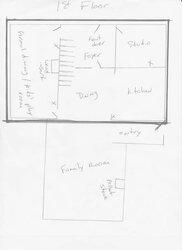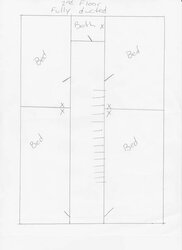Help! We might need to sell/rent the house very soon and need to get a central heating system in place.
Quick facts:
- 1920s colonial with a 1st floor addition and renovated attic into master bed circa 1980s. About 2,500 sf total.
- Original house (1st and 2nd floors) is ducted and is ~1,550 sf. Currently, there is no furnace connected to the ducts. It was condemned and has been removed. We rely 100% on wood and have been quite successful.
- Addition and master bed have baseboard hot water from a propane boiler. But, we rely on a pellet stove to heat the addition and what is now the kitchen and dining room (see drawings). The master bed benefits from the wood insert. We've only used the propane once this year to heat that space.
- My artwork is something to be desired, but I think you'll get the drift. The box around the first floor indicates which part of the house is ducted. The second floor is completely ducted and the Xs mark where the ducts are.
- Lots of doors allow us to regulate the temps. We close the doors to the dining room so that the pellet heats only the family room, kitchen and dining rooms. The wood insert takes care of the rest, but we do keep the unused rooms closed unless they are in use.
We need to figure out how to heat the ~1550 sf of space that is currently not supported by the boiler/baseboard. We can utilize the existing duct work and install a ducted heat pump, or we could add a zone or two to the propane boiler (wall mounted Penzotti). But this could go one of two ways ... 1. install baseboards or 2. connect to existing duct work.
I like connecting to the duct either with a heat pump or through the boiler because it eliminates the need to install baseboards, although heating efficiency might suffer some and could be the more expensive option. But, to be honest, I'm not sure how we could add baseboard to the kitchen, dining room and 2nd floor bath without some form of renovation. Wall-mounted radiators?
The rest of the rooms could be done pretty easily and the boiler shouldn't have a problem handling the extra load.
How should we approach this?


Quick facts:
- 1920s colonial with a 1st floor addition and renovated attic into master bed circa 1980s. About 2,500 sf total.
- Original house (1st and 2nd floors) is ducted and is ~1,550 sf. Currently, there is no furnace connected to the ducts. It was condemned and has been removed. We rely 100% on wood and have been quite successful.
- Addition and master bed have baseboard hot water from a propane boiler. But, we rely on a pellet stove to heat the addition and what is now the kitchen and dining room (see drawings). The master bed benefits from the wood insert. We've only used the propane once this year to heat that space.
- My artwork is something to be desired, but I think you'll get the drift. The box around the first floor indicates which part of the house is ducted. The second floor is completely ducted and the Xs mark where the ducts are.
- Lots of doors allow us to regulate the temps. We close the doors to the dining room so that the pellet heats only the family room, kitchen and dining rooms. The wood insert takes care of the rest, but we do keep the unused rooms closed unless they are in use.
We need to figure out how to heat the ~1550 sf of space that is currently not supported by the boiler/baseboard. We can utilize the existing duct work and install a ducted heat pump, or we could add a zone or two to the propane boiler (wall mounted Penzotti). But this could go one of two ways ... 1. install baseboards or 2. connect to existing duct work.
I like connecting to the duct either with a heat pump or through the boiler because it eliminates the need to install baseboards, although heating efficiency might suffer some and could be the more expensive option. But, to be honest, I'm not sure how we could add baseboard to the kitchen, dining room and 2nd floor bath without some form of renovation. Wall-mounted radiators?
The rest of the rooms could be done pretty easily and the boiler shouldn't have a problem handling the extra load.
How should we approach this?


Last edited:

